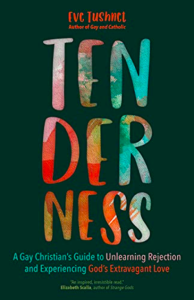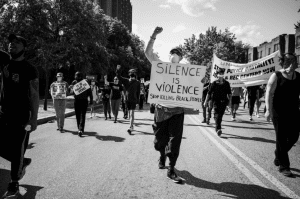Eve Tushnet, author of Gay and Catholic, Amends, and Punishment: A Love Story, has just released another book! This is a sequel to her partly-memoir debut work, Gay and Catholic, and deals more with the practical side of figuring out how to do Catholicism as a gay person without getting homophobia poisoning. It’s called Tenderness: A Gay Christian’s Guide to Unlearning Rejection and Experiencing God’s Extravagant Love.

I rarely pre-order books, but I pre-ordered this one. It showed up last week, and I finished it tonight. (I usually get through books a lot faster, but it’s been a bear of a December at work.) Let’s dive in!
It’s divided into four unequal parts. The first part is “The Gay Christian Drinking Game,” which goes over the trauma conga line a lot of us endure as LGBTQ people growing up and/or living in the church.1 The second part discusses new ways of conceptualizing same-sex love: how to draw correct distinctions between gay love (or more accurately, loves) and gay sex, how gay sexuality can point us toward aspects of Christian community our society neglects or even suppresses, and some (not all) of the ways celibacy can be experienced as a blessing rather than a burden. The third and longest part, “The Church Suffering,” deals with a lot of the hardships of being a gay Christian—some that come from within, many that others impose upon us. The fourth part, which has a large number of especially short chapters, gives pointers on ways to find God’s tenderness through a variety of practices, some explicitly spiritual, others not.
The Strong Points
Eve is one of the most approachable writers I’ve ever found. Everything she says feels, for lack of a better word, comfortable: she isn’t straining to be chummy (which I find cloying), she never feels arch or abstract or precious. It’s really pleasant and refreshing to read something like that; you almost feel better afterwards.
But anyway, on to the, you know, topic of the book. I found the advice she gave really positive; in one or two cases, it gave me that little flutter of nerves you get when you recognize “This is a really good idea, and I’m quite afraid to try it!” A lot of it is advice that I think every Christian would do well to try. The chapter on forgiveness—tellingly titled “If I’m Celibate, Can I Still Flirt With Anger?”—is especially good. So are the two closing chapters, “It’s His Body and I’ll Cry if I Want to” (on adoration) and “All the Names of God” (on finding new and nourishing forms of prayer).

Besides all of that, though, I think this book represents an advance in … let’s call it “Side B2 politics.” I’ve been comparatively radical and open to queer theory since before my conversion, but a lot of Side B Christians are pretty socially conservative. Sometimes that’s just a difference in temperament, and I try (with mixed success) not to be judgy about that. Other times it makes me really uncomfortable and seems to excuse or even prop up things I think are genuinely unjust.
I was therefore especially thrilled by the following excerpt:
Christian homophobia means that gay people hear, over and over again, many true things that are said in ways or in contexts that make them lies. … [For example,] “Homosexuality is just a social construct.” This, I think, is more common among conservative Catholics. Protestants get more into how you can’t limit God’s power; Catholics always think we can translate the Christian sexual ethic into secularese. Anyway, this statement is mostly true but not quite as true as its proponents (I’m one, really) think. …
One way to tell when the social-construct argument is being abused is to ask what we’re supposed to do about it. Nine times out of ten, your straight conservative interlocutor thinks you should stop calling yourself gay, considering yourself a part of the gay community, and being gay in ways that straight Christians might have to notice and think about. In exchange, they might agree to stop calling themselves “heterosexual”—though of course no one would expect them to stop wearing their wedding ring, or talking about their fiancée, or using their spouse’s employer-provided health insurance. As long as you agree to make it harder to talk about your life, they’ll agree to make it harder to talk about their privilege.
Here’s a decent rule of thumb: When a truth is being spoken in order to pressure only a marginalized group to change, with no change expected of the majority, the truth becomes a falsehood.
GET ‘EM, GIRL.
The Weak Points
I literally don’t have anything to put in this category! So I’m instead going to talk about something Tenderness could perhaps have included, but didn’t.

This isn’t a uniquely LGBTQ experience, but I think it’s relevant to LGBTQ Christians in some unique ways: the feeling of being not only abandoned or wounded, but specifically betrayed by the church, due to the open and rampant corruption of so many Christian leaders. The hypocrisy of the Catholic hierarchy is perhaps the most glaring. But there are plenty of figures like Jerry Falwell or Doug Wilson3 or the Duggars in the Protestant world: men and women who breathed fire against gay and trans people for decades, only to turn out to have not only skeletons in their own closets, but the exact skeletons they were frying us for. (To be blunt, maybe even unkind, it leaves you wondering whether there might be a private reason so many of these people are so sure that all gay people are pedophiles.)
Like I said, hurt and horror over Christian sexual abuse is not a uniquely queer experience. But not everybody gets made scapegoats as remorselessly and incessantly as we are. I think a lot of what Eve wrote in Tenderness can be brought to that wound, but I would have been (and would still be!) interested to hear her discuss that element in LGBTQ Christian life more particularly.
Should You Buy It?
Yes! A+. Buy it for the gay Christian who’s in your life. Buy it for yourself. Buy it for your gay Christian self who’s by definition in your life. It’s excellent.
1I use the uncapitalized church here because I mean Christianity in general, including but not limited to the Catholic Church (and bodies with apostolic succession more generally).
2For anyone unfamiliar, Side B is a longstanding nickname used by and for LGBTQ-identifying Christians who believe in a “traditional” sexual ethic, i.e. that Christian marriage is properly between one man and one woman. This covers a lot of gay Catholics, including Eve and myself, as well as a number of gay Protestant authors like Wesley Hill, Bridget Eileen Rivera (though I don’t think she uses the term), and Gregory Coles.
3For those who aren’t aware, Doug Wilson was (and to some remains) a Reformed luminary who, among other things, encouraged a man he knew was a pedophile to get married and start a family; I include this link to Rod Dreher’s article on the subject, lest anybody accuse me of being unfair to Wilson.












